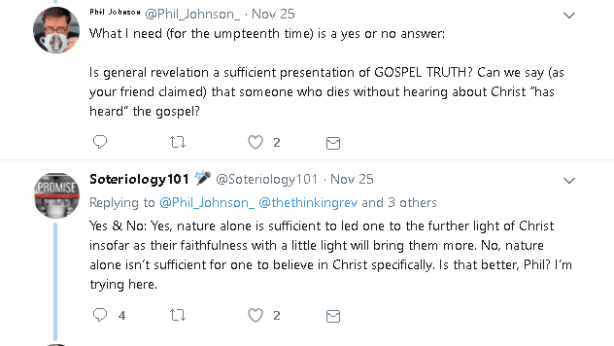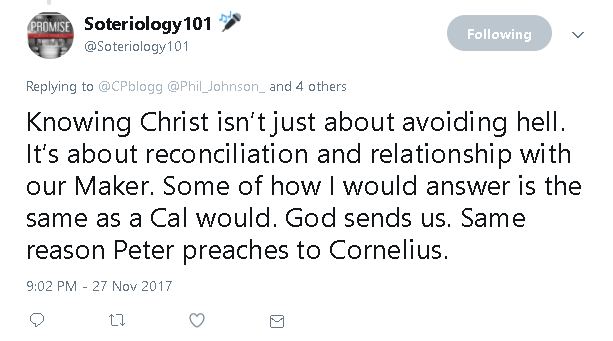So, I want to write a response to Dr. Leighton Flowers on the area of revelation, hopefully to add clarification on the issue. On a recent lengthy Twitter discussion, he was asked a simple question by Phil Johnson that he refused to answer simply on Twitter (and he easily could have, as will be seen in his own words). The term “refused” does seem quite rude, or at the least petty, but I want to attempt to show that it is the correct use.
The question posed to Dr. Flowers was, “Is nature alone a sufficient proclamation of Gospel truth?”
Why is that question so important? Answering “Yes” now puts you in danger of worldviews opposing that of Christianity. If you believe that apart from any truth in the scripture you can be saved, you are only a step away from falling into the pitfall of pantheism, pluralism, and inclusivism. In fact, some of the people supporting Soteriology 101 on this particular question were inclusivists (“Bible Brodown” was their name). This is the idea that you do not have to have explicit knowledge of the death, burial, and resurrection of Jesus in order to be saved.
Thankfully, Dr. Flowers does not believe this…however, his answers are completely confusing…(this parenthetical statement is written later, as you can see, my original intent was to defend Dr. Flowers. After his most recent post, I have to retract that statement, I suppose, for now at least…. maybe he does believe this??)

So, yeah… I mean the answer makes since, only if you’ve read everything Dr. Flowers has written about it. If you haven’t the answer sounds almost scary. The question itself is a defining moment of orthodoxy. Anyone answers “yes” to the above question (especially the qualification “that someone who dies without hearing about Christ ‘has heard’ the gospel?”) puts you outside the bounds of both the BFM 2000 and the Traditionalist Statement on Salvation….
***Starting here is after when I read Dr. Flower’s response to me (below)
Dr. Flowers response was confusing to say the least, but now I can say I’m officially confused. I originally started this post to defend Dr. Flower’s orthodoxy. I was originally interpreting what he was saying as follows:
- Random individual responds positively to general revelation (a little light)
- God then gives specific revelation (i.e. “more light” through a missionary or the likes e.g. Cornelius)
- That person is then saved because of their faith placed in the specific revelation
In other words, to my understanding, you have to be able to decide to put your faith in Christ in order to be saved. That’s one of the greatest capabilities according especially to their interpretation of libertarian freedom. But I assumed an individual had to have some basic, specific knowledge about Jesus in order for them to be able to place their faith in Jesus. Mainly because that’s what the BFM 2000 says, “There is no salvation apart from personal faith in Jesus Christ as Lord.” and “Faith is the acceptance of Jesus Christ and commitment of the entire personality to Him as Lord and Savior.” How can this type of faith exist if there is no knowledge of Jesus or his identity as “Lord” and “Savior”?
I guess that assumption was incorrect…


So… as of right now I’m at a loss of words to defend Dr. Flowers. My prayer is that, as of right now, I still just do not understand what he is arguing at all. I personally am not anti-Traditionalist. I believe in and am thankful for the great theological wealth we have in the SBC. I’m thankful that we have these discussions. I would never say or argue that Arminian theology or Traditionalism is a danger to be avoided.
However, I would argue that “[people] don’t have to have specifics to be saved” is a danger to be avoided. It is explicitly denounced by the BFM 2000 (article 4). And it is, or so I thought, denouced by the Traditional Statement on Salvation (article 5).
I do believe a Traditionalist can maintain that “the law,” “prevenient grace,” “general revelation” can bring a person to respond positively to God (but not to salvation). I believe it would be completely within orthodoxy to then say that God would always be faithful to give specific revelation to those who responded positively to those above means which would thereby lead them to salvation. I would not agree with those arguments, personally, but I do believe they would be within orthodoxy.
I went to a very Anabaptist school for my undergrad in Christian Studies. Here they denounced the “effectual call” and insisted on what they called the “gospel call.” So, instead of there being an effectual call that goes out only to the elect, they would maintain there is a more general “gospel call” that goes to everyone who hears the gospel (hears the “specifics”) which in turn waking their spiritual ability (a form of prevenient grace, though they would not equate it with that) to choose or reject God. Give me more Traditionalists like that! Give me the Traditionalist who stands on the preached word of God, and sure Gospel truth! This is the dire need for missions!
And even though I did not agree with those particular arguments, I would never say that belief is a danger to be avoided. Sadly, as of right now, I cannot say the same thing about Dr. Flower’s view of general/specific revelation and its relation to salvation. This view will easily lead to inclusivism and a lack of evangelism. Please, be aware, and pray that I’m wrong. Because.. honestly I would rather be wrong about this, recant this post and be able to again defend Dr. Flowers fully.
Well, update again…in response to my “How do you avoid the danger of inclusivism/pluralism from that perspective?…if people don’t need “specifics to be saved”? Why share the Gospel?”

Why should we share the Gospel? Dr. Flowers says because “God sends us.” In this perspective, we ultimately do not have to go share the Gospel, we do it out of obedience to his sending. This is not the Calvinist perspective, by the way. However this is the hyper-Calvinist perspective.
The Calvinist perspective is that God operates by means. We are the broken instruments in his hands that he uses to paint the beautiful picture of redemption. In the Calvinist perspective, if we do not go and share the Gospel with people, they will not be saved, because they do not know Jesus to even have faith in him. Therefore, we are responsible for sending people to hell when we lack in evangelism. People’s blood was not on Paul’s hands (Acts 20:26). Why? Because Paul did not shrink back in preaching the whole counsel of God (v. 27). Can we not say the opposite is true? From the Calvinist perspective, I would say “yes”. From most Traditionalist perspectives I know of, I would say “yes”. From Dr. Flower’s perspective, we’re hard pressed to say “yes”. If people don’t even need the specifics, if people don’t even need the whole counsel of God, then is there any blood on anyone’s hands for shrinking back? It would seem from Dr. Flower’s perspective the answer would be a sheepish “no”.
